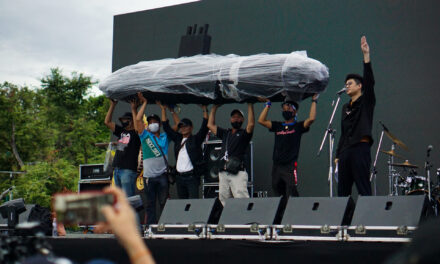By Walden Bello
Before the US-UK invasion of Iraq, I was occasionally invited to television talk shows to provide an “unconventional” counterpoint to Philippine government officials who confidently echoed the Washington’s scenario of a quick war. But it was probably only at the Iraqi-Syrian border on March 17 that I became solidly convinced that the US had a protracted conflict on its hands. At the otherwise nondescript “VIP Lounge,” our Asian Peace Mission leaving Iraq encountered about 20 young men going in the opposite direction. They were Moroccans, Algerians, Lebanese, Syrians, Egyptians, Palestinians. In their late twenties, thirties, or forties, they were obviously not green, with some said to be veterans of Israeli jails. They were in high spirits, obviously relishing what they regarded as a rare opportunity to face the hated Americans in battle. Were they Arab volunteers, I asked. “Islamic fighters,” I was corrected.
US Secretary of Defense Donald Rumsfeld recently attacked Syria for allegedly sending weapons, including night vision goggles, to Iraq. But what he was probably most upset about but could not mention on pain of giving more evidence that things were not going according to plan was the transit through Syria of these Muslim fighters, whom Baghdad now claims number in the thousands.
Volunteers and Militia
These militants are joining the estimated 750,000 trained and well-armed militia that the Iraqis say they have. Even if only a third of these were actually available, the US force that is poised to enter Baghdad would have its hands full. But what the US faces is probably an even greater number of effective combatants since many ordinary men, women, and children are likely to join the fray.
These were supposed to be the people who would rise up against Saddam in Rumsfeld’s script. Had US intelligence agents talked to Maha, the Iraqi refugee who was on the same plane with me from Damascus, they would have had very serious reservations about this scenario. She told me that her brother and sister also had a chance to flee before the fighting broke out, but “they decided to stay and fight together with their families.” Had they had the freewheeling discussion we had on March 16 with the students at Baghdad University, they would have torn up the Rumsfeld script, for one thing was unquestionable: beneath the cheerful banter, these young men and women were ready to die for their country and their faith.
Confusion in Washington
While Baghdad and its population radiate resolve, two weeks into the war Washington is in confusion. Rumsfeld says nothing went wrong, everything went according to plan, while one of his top officers, Lt. Gen. William Wallace says that “the enemy we’re fighting is different from the one we war-gamed against.” US Theater Commander Tommy Franks says “there is a continuity of operations in the plan,” Rumsfeld declares “we have no plans for pauses or ceasefires or anything else,” while Gen. Richard Myers, chairman of the Joint Chiefs of Staff speaks about “an operational pause in a macro sense.”
What seems to be clear to everybody outside the Bush bubble is that almost nothing in this war has evolved as planned: not the conventional battles that would decimate the Iraqi regular army, not the Muslim Shiite uprisings that would smash the Ba’ath Party political administration and set the stage for coalition troops to be welcomed as liberators, not the bombing campaign that would shock and awe the rest of the population into submission.
The truth is that even as Central Command propaganda paints the image of rapid advance, the American campaign has ground to a virtual halt before Baghdad. The British are stuck in Basra. All the way up and down the 450 kilometers between the Kuwait border and their leading elements before Baghdad, coalition troops are being harried by Iraqi irregulars. Inability to distinguish between combatants and civilians is frustrating US troops, leading them to commit one atrocity after another. “Operational macro-pauses” will not solve the American dilemma: having failed to either provoke civil uprisings or draw out the Iraqi regular army to the set piece battles where they could be defeated in detail, the US has no choice but to assault Baghdad without being sure of the outcome.
The Urban Nightmare
Recent American experience in urban warfare has not been pleasant. The casualty rate involved in retaking the 22 or so cities that staged uprisings during the Tet offensive in Vietnam was prohibitively high, and when the whole bloody business was finally over, Washington had won the battle but had lost the war, being forced by the precipitous drop in the US public’s support for the war to go to the negotiating table.
Mogadishu, October 3, 1993, is a name and date that still rankles in the US Army. Its inflicting over 1000 casualties on the swarming Somalis did not mitigate the fact that a heavily armed Ranger unit was badly mauled, losing 18 dead and 84 wounded, leading to a humiliating US exit as the US public lost appetite for a “peacekeeping mission.”
But if the Pentagon is unprepared for what lies ahead, it is not for lack of warning. At a hearing at the US House of Representatives reported by the Financial Times last November, Ret. Gen. Joseph Hoar, former commander in chief of Central Command, said, “In urban warfare, you could run through battalions a day at a time…All our advantages of command and control, technology, mobility—all those things are, in part, given up and you are working with corporals and sergeants and young men fighting street to street.” One might add that as technological advantage is nullified, morale begins to spell the difference, and high morale is what urban partisans fighting for kith, kin, and country have an oversupply of.
Nor were the Iraqis shy about giving warnings: As Mohammed Medhi Saleh, a senior member of Saddam Hussein’s cabinet told the Washington Post last November, “Take the desert. What’s in the desert? If they want to change the political system in Iraq, they have to come to Baghdad. We will be waiting for them here.”
“Nightmare” is the word many commentators use to describe any attempt to take a densely metropolis of 4.5 million like Baghdad, where, as in most other third world cities, residential, commercial, military, and government establishments coexist in close proximity; where civilians and partisans will be indistinguishable since one will be fighting a hostile population in arms; where no street can be considered fully secured; where partisans will be on one’s front, right, left, rear, and under. In short, as Mark Bowden, author of Black Hawk Down, puts it, a “360 degree battlefield.”.
Then there is a question of numbers. During the guerrilla conflicts in Southeast Asia in the sixties, anti-insurgency experts used to say that to neutralize one guerrilla, you needed six or seven soldiers. Such a ratio translated into a Baghdad setting would underline one thing: that the maximum 50,000 to 65,000 frontline combat troops that the US can deploy for the taking of Baghdad would be grossly inadequate.
Finally, there is the climate, the element that felled both Napoleon and Hitler in their invasion of Russia. Spring is ending, and Baghdad will soon be visited by the horrific Iraqi summer, when temperatures can go as high as 60 degrees centigrade. In fact, it is not unlikely that the number of coalition troops felled by heat stroke might rival, if not outstrip, the number of combat casualties.
Military Stalemate and the Global Peace Movement
More and more likely as a scenario in the next few weeks is one comprised of the following elements:
American indecision, owing to internecine command battles, delays a full-scale assault on Baghdad.
More and more volunteers from throughout the Arab and Muslim world make their way to the desert Stalingrad, transforming the battle into an apocalyptic struggle between the Arab and Muslim peoples and the “Great Satan.”
Washington launches an assault that quickly becomes a debilitating stalemate.
Outright military defeat for the US is not a likely outcome, though some very credible experts like Scott Ritter, the controversial former UN arms inspector, says that the US military might be forced to stage a desert version of Napoleon’s retreat from Moscow.
The Challenge to the Global Peace Movement
In the context of a military stalemate within a widening war, the role of international protest and diplomacy becomes all the more critical. Washington might have been able to turn a deaf ear to other states in the global community when it was confident of its strength. It may no longer be so brash when it is confronted with a no-win military situation. For forces opposing the war, now is the time to press on with the demand for unilateral withdrawal of the US and UK from Iraq. At a time when the situation is far from being resolved on the battlefield, it would be betraying the Iraqi people to shift the struggle to the politics of reconstruction—to the false debate of whether it should be the UN or the US that should manage post-war Iraq. This debate would only have the effect of legitimizing the ongoing invasion. Support for the Iraqi people’s defense of their homeland, not support for UN-led reconstruction, should remain the overriding stance of the international community.
Indeed, this should be the case even if Baghdad falls, for the fall of Baghdad will not mean an end to the war. In this context, international diplomacy must support such initiatives as the Arab League’s effort to get a Security Council resolution demanding an end to the invasion and, failing that, to bring the matter to the General Assembly.
For the impressive international civil society movement against the war, this is a time for even bigger demonstrations demanding withdrawal of the US and UK. It is also time to move from spontaneous, country-by-country action to greater global coordination. The international legal machinery must be set in motion to try Bush, Blair, Rumsfeld and other key decision-makers for violations of international law and war crimes. Where Washington and London block UN and other official judicial processes, international people’s tribunals involving leading anti-war personalities would be a good substitute.
Aside from efforts to strip the stalled war effort of its last ounce of legitimacy, the movement should launch punitive economic campaigns, such as coordinated international boycotts of US and British corporations such as Macdonald’s, Coca Cola, Exxon, and Shell. With the sources of profits of American-owned corporations having become globalized, such campaigns could erode support for the war from a key constituency of the Bush administration.
The American Problem
Needless to say, winning the American people away from support for the war is one of the greatest challenges of all. Bush is the ultimate unilateralist. So long as he is confident of domestic support for his war, his response to battlefield reversals, as Richard Holbrooke, the Clinton administration diplomat, has noted, will be to “escalate.”
There are three key prongs to a successful strategy to win over public opinion, and each will have to be mounted with more care and planning than has gone to the US military’s strategy in Iraq:
a massive effort to win over and consolidate the key pillars of a popular anti-war movement: labor, women, minorities, and students.
A campaign to pressure the Democrats to cease being a loyal opposition and to exploit existing differences among Republicans. Principles carry little weight with American politicians, so this campaign might need to establish a forceful link between the deteriorating domestic and global economy with the pursuit of the war and make this an issue in the 2004 elections.
A drive to divorce Wall Street and Main Street from the Bush Camp that would also pound on the connection between the war, the deficit, a weak dollar, rising oil prices, and global recession.
If Bush can unswervingly push a unilateralist line, it is because he is confident that since September 11, he and his clique have reshaped the popular consensus that serves as the underpinning of an imperial democracy such as the United States. Dismantling that consensus can only be successful by appealing to interests, though appeal to principles must continue to be made. Breaking the current American consensus that is based on the idea that imperial expansion is the ultimate solution to security is a precondition for ending this war and preventing future wars. This is a tall order, but it is one that the US and global anti-war movements have no choice but to tackle head-on.
*Walden Bello was a member of the Asian Peace Mission to Baghdad, March 12-17, 2003. He is executive director of Focus on the Global South, an analysis and advocacy program of the Chulalongkorn University Social Research Institute, and professor sociology and public administration at the University of the Philippines.



![[In Photos] Kalampag: Campaign Against Hunger](https://focusweb.org/wp-content/uploads/2017/04/xunnamed-440x264.gif.pagespeed.ic.7lAfyfY_32.jpg)





